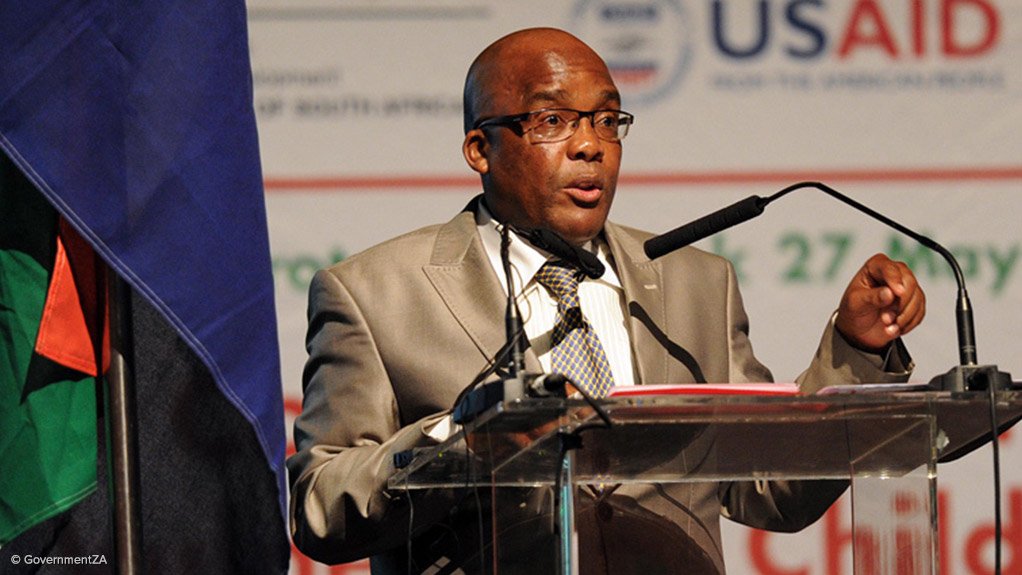/ MEDIA STATEMENT / The content on this page is not written by Polity.org.za, but is supplied by third parties. This content does not constitute news reporting by Polity.org.za.
The Minister of Health Dr. Aaron Motsoaledi says the low rate of exclusive breastfeeding in South Africa and many parts of the world is concerning as breastfeeding contributes to child survival.
“It is of great concern that exclusive breastfeeding rates globally and in our country are extremely low. Globally it is estimated that only 36% of moms breastfeed their infants for at least 6 months. In South Africa we estimate that only 39% of mothers breastfeed exclusively for 14 weeks after the baby is born and the figure is much lower at 6 months at only 8%. Our exclusive breastfeeding rates are amongst the lowest in the world. We must all work harder to ensure that we support mothers to exclusively breastfeed for at least six months and rapidly reach a target of at least 50% of mothers breastfeeding for at least 6 months after the infant in born. This will require an extra mile by all of us to encourage and support breastfeeding mothers by improving their workplace and social environment,” said the Minister of Health, Dr Aaron Motsoaledi.
The Department of Health joins the rest of the global community to commemorate the World Breastfeeding Week on 1-7 August, to reinforce the importance of support for exclusive breastfeeding for at least 6 months of the life of infants, to improve the health of babies in South Africa. This year’s theme is: No matter who you are – you can support a mother to breastfeed her baby for a better, healthier life.
The country’s National Development Plan (NDP) highlights the importance of promoting health and wellness to reduce maternal, infant and child mortality. This also contributes towards the reduction of under-five child mortality from 56 to below 30 per 1000 live births by 2030. Exclusive breastfeeding is therefore relevant to this sustainable development goal (SDG) which seeks to ensure good health, development and survival of infants and children, as well as contributes to the wellbeing of mothers.
This commitment is informed by the resolution of the World leaders who agreed to 17 SDGs to be achieved by 2030, which includes the need to educate people to support breastfeeding to contribute to the success of the SDGs. The lack of support for breastfeeding is attributed to inadequate information from health care workers on breastfeeding management, and lack of support within the households with negative attitudes towards breastfeeding as well as unsupportive work environments. These conditions make it difficult for women to breastfeed exclusively for six months and to continue breastfeeding for two years or longer, as recommended by the World Health Organisation (WHO).
The objectives of the World Breastfeeding Week are:
- To emphasise the importance of supporting breastfeeding mothers in order to improve exclusive and continued breastfeeding
- To highlight the role of family, community, health care workers, employer/ workplace, public places in creating an enabling environment that supports breastfeeding
- To inform people about the new Sustainable Development Goals (SDGs) and how they relate to breastfeeding and Infant and Young Child Feeding (IYCF).
- To influence attitudes and behaviours of the public to recognise (and encourage others) that exclusive breastfeeding during the first six months of life is the norm and the optimal way of feeding an infant for optimal growth and development, as well as.
- Recognise and encourage others that after 6 months, the introduction of appropriate complementary foods whilst continuous breastfeeding up to 2 years or beyond key optimal growth development and survival.
Supportive environment
Exclusive breastfeeding is defined as giving the baby only human milk with no supplementation of any type, which means no water, no juice, no non-human milk and no foods, except for vitamins, minerals and medications prescribed by a doctor or health care worker, to ensure child’s survival. Globally, malnutrition has been responsible, directly and indirectly for up to 60% of the 10, 9 million deaths annually for among children under five, especially amongst poverty-stricken families.
Health workers, families, employers, communities and the public at large, have the social responsibility to provide a supportive environment to all mothers to breastfeed their babies. A health worker can assist the mother to start breastfeeding within the first hour after birth, and provide continuous support to mothers to breastfeed until 2 years, during clinic visits, home visits and offering health education in waiting areas. Families must respect the mother’s decision to breastfeed her baby and help her with routine household chores. Employers can provide a supportive environment for mothers to breastfeed or express milk. Communities can form breastfeeding support groups or use existing groups to support mothers. Public spaces for mothers to breastfeed should be considered for taxi or bus ranks and train stations, airports, shopping centres, etc.
The Department of Health, working with key health stakeholders including the US Centre for Disease Control and Prevention (CDC), will also use the national women’s month to highlight the importance of support for mothers to breastfeed, whose key benefits range from providing the nutrients, promote mother and baby bonding. It also acts as a form of family planning, against falling pregnant soon after delivery, in combination with contraceptives which are safe to use while breastfeeding. The activities to promote breastfeeding are guided by the South African Infant and Young Child Feeding Policy of 2013, which views breastfeeding in a broader context of its role in the reduction of Non-Communicable Disease (NCDs).
Issued by GCIS on behalf of the Department of Health
EMAIL THIS ARTICLE SAVE THIS ARTICLE
To subscribe email subscriptions@creamermedia.co.za or click here
To advertise email advertising@creamermedia.co.za or click here











